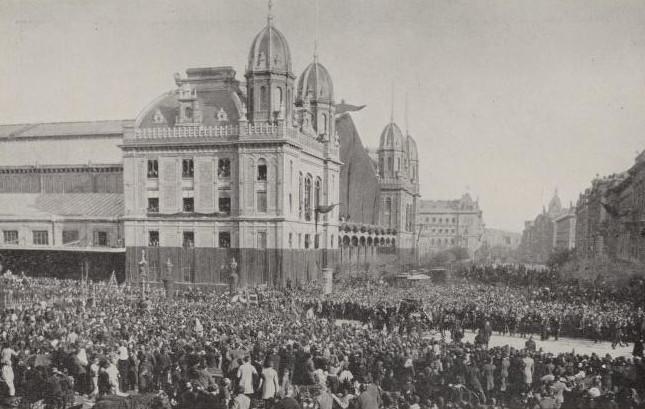Note: This article has been excerpted from a larger work in the public domain and shared here due to its historical value. It may contain outdated ideas and language that do not reflect TOTA’s opinions and beliefs.
From When I Was a Girl in Hungary by Elizabeth Pongracz Jacobi, 1930.
When the harvest was over, when all the grain had been threshed, and teams of twisty-horned white oxen were harnessed to the ploughs, we had to return to the city.
On our last evening in Eörs, Vici and I went to say good-bye to all our friends. We visited the dogs, the horses, and the sheep, with lumps of sugar and handfuls of salt to suit every taste. Finally we went into the cow-house.
It was warm and cosy on a chilly night like this one. Here all the farm hands assembled for a friendly chat when the day’s work was done. The cows were lazily chewing the cud, and the hanging oil lamp shed a friendly circle of light.
“So you must go back to school, ifiur,” Galambos bacsi the cowherd said. “What’s the good of such a lot of studying? Sure it’s bad for your health!”
“That’s what I think,” Vici assented readily. “I would much rather stay here and look after the farm and play the piano. But my father thinks differently.”
“Quite right, too,” Szatay bacsi said. “If the young gentleman wouldn’t go to school, he’d remain as great a donkey as you are, Galambos. A gentleman can’t do with just reading and writing like a stupid cowherd. He must study for eight years in a Middle School, and then go to the university and be a doctor or a lawyer or such-like—like Elemer ifiur.”
Galambos did not seem quite convinced.
“And you, Missie—need you go to school, too? ”
“Oh, no,” I said ruefully, “I should like to, but Papa says a little girl had better learn her four elementary classes at home. I shall only go to school when I am ten, to Middle School. But I’m going to university, too—I shall be a doctor when I grow up.”
“Ha, ha, ha—not even my great-grandfather ever heard of such a thing! ” Uncle Gardener declared. Everybody was laughing. “A woman doctor! You are a funny one, Missie! ”
“Well, perhaps I shall be a writer or a painter, or perhaps I shall have two dozen children,” I gave in.
“That’ll be much better, Missie. Well, God bless you, and give you good health. Don’t study too much, and come back next year!”
After the long, lazy vacation days we were all quite glad to return to the bustle and the duties of our town life. I had lessons with Papa. We called them lessons, but they were really half-hours of fun. Yet somehow by the end of the year I had learned all I need know for the examinations, and a great deal more that is not taught in schools.
I also began to learn English at this time. Fraulein had gone, and we had an American governess instead. Miss Minnie Myer hailed from Boston. We rather liked her, but I am afraid she found us a handful. I can still recall the plaintively shocked tone in which she used to say, “Why-y, Victor...” if my brother had been up to some of his droll mischief. We also composed a sort of chantey in her honor. I can’t remember more than the first two lines:
“She was born—hark to my ditty!
In the States, in Boston city.”
All the same, Miss Minnie and we were great friends. She was new to Budapest, and I delighted in showing her the sights of our fine city.
Our daily walks mostly took us over one of the bridges across the Duna (Danube) River, to the old part of the town. We loved the narrow old streets, the quaint houses, ancient Matthew’s Cathedral, and the shady walk along what had once been the castle ramparts.
“You know, Miss Minnie, when the Turks were in Hungary, they held the Fortress of Buda for a hundred and fifty years. Wasn’t that dreadful? But then we took it back, and drove them away,” I told her as proudly as if I had led the charge in that battle, more than two hundred years before.
Miss Minnie admired the old church that had been a mosque in the Turkish days. The Cathedral bells were chiming twelve. Suddenly, the quiet streets echoed to the sounds of a band. This was the hour for the changing of the Guards at the Royal Palace.
“Come, Miss Minnie, let’s run and look!” I dragged her along, willy-nilly. A stream of children followed the regiment. The conductor of the band looked more pompous than any General, and little street Arabs marched behind him, imitating his stately gestures with his staff. A white pony carried the big drum. One just couldn’t help feeling gay and keeping time to the music.
“The King must be here,” I told Miss Minnie excitedly, “else they wouldn’t change the Guards like this.”
“Why, isn’t he here all the time?”
“Oh, no—not very often. You see he is Emperor of Austria as well as King of Hungary—that is just the trouble,” I added, pretending to be very wise.
“Why, what does that matter?” It must have amused Miss Minnie to draw me out. It was rather funny that a small child like me should talk about politics. But these things were so often discussed, of such vital importance to every one, that children in my time could not help hearing about them.
“Well, you see, he likes Austria best, because he was born there. And he wants all the soldiers to speak German. Everybody must be a soldier, and it is very difficult for Hungarian peasant boys to learn German. They don’t like to be ordered about by Austrian officers. But Queen Elizabeth is fond of Hungary, and she is very good and beautiful, only she is very sad since her only son died.”
Miss Minnie said, “I see,” rather breathlessly. We had been running to keep up with the soldiers. In front of the Palace gates the Guard was being changed. The band played, and on a balcony appeared the fine straight figure of old King Francis Joseph. The people cheered, and in spite of all I had just been saying, I cheered lustily with the rest. Then we turned homewards, to relate proudly that we had seen the King, and he had saluted us!
At other times we would walk along the embankment. The view from this riverside walk is one of the prettiest I have ever seen. The wide stream spanned by handsome bridges, rocky St. Gellert Hill opposite, with the old castle on top; Castle Hill crowned by the Royal Palace, the many spires of the old city, gentle hills rising in the distance—I had to show Miss Minnie all that. Then we would walk up-stream to Parliament House, and have a look at St. Margaret’s Island where we loved to spend spring afternoons among the ruins of an old, old convent.
Sometimes we would meet Papa, taking his midday constitutional on the embankment. He would take us down the steps to the water’s edge. Barges were anchored to the landing-stages, the steamboat from Vienna discharged her passengers, swift little local boats crossed the stream, and placid fishermen cast their nets over the water.
“The ice is drifting,” Papa said. “If this frost continues, the river will be blocked in a few days. No more shipping until spring!”
“It doesn’t matter,” I said. “One can always walk to Buda over the bridge.”
“One can now, dear, but one couldn’t sixty years ago. You know that Buda and Pest used to be two separate towns. Buda was the more ancient, built around the castle, and dating back to Roman times. Pest was the busier, more modern city. In those times no one thought of building bridges of this length.”
“How did people get across, then?”
“In summer there was a boat-bridge floating over the Duna. Planks were laid across boats anchored side by side. But when the first frost came, it was taken to pieces and stored away until next spring. Then the twin cities were cut off from each other for months.”
But couldn’t people get across if the river was frozen?”
“If it froze very hard, yes. But often people ventured across before the ice was bearing, and there were terrible accidents. I remember one that happened when I was a young man. It was a very hard winter. The Duna was coated with ice for many weeks. There was regular traffic across the river. Show-people and pedlars set up booths, a band played on the ice, and people walked across just for fun. One day it began to thaw more rapidly than any one had expected. Suddenly there was a terrible crash—the ice cracked —and some forty people were drowned. Since then it is strictly forbidden to venture on the ice of the Duna.”
One day in early spring, Papa took me for a walk. He was rather more silent than usual.
I noticed that there were black flags and draperies on many of the houses. And somehow I felt, although I did not know it, that the people we passed in the street looked depressed.
“Papa, why are there so many black flags?”
Papa bared his handsome silver head.
“Because a great man is dead, dear. Louis Kossuth died this morning.”
I knew who Kossuth was, just as every American child knows the name of George Washington. He was the leader of the Hungarian struggle for liberty in 1848, and Governor of the country when the nation rose up against Austrian oppression. After a heroic fight, the Hungarians were overcome by Russian armies which the Austrians had called in to help them. The suppression became worse than ever, and Louis Kossuth had to flee from the country.
Many years later, Hungary was reconciled to Austria. Both countries together formed a monarchy with equal rights for each. But many people still said that Hungary would be happier and more prosperous if she were independent of Austria.
The name of Kossuth still was a byword in every Hungarian family. His picture hung in every home, however humble. We had been brought up on tales and legends of that great struggle of 1848, and my own grandfather had been a captain in Kossuth’s army.
“The Governor was very old,” Papa said. “But many people still went to see him at his home in Italy, as worshippers go on a pilgrimage to a holy shrine. The King never forgave him for initiating the revolution. The greatest leader whom the Hungarian nation has ever known, the King considered a rebel.”
“And did Kossuth never return to Hungary after 1848?”
“Never. He went to England and to the United States where he won many friends to the Hungarian cause. In America, Governor Kossuth was received like a sovereign. He was a wonderful orator. Everywhere he travelled, making speeches, telling people about our unfortunate country. He tried to raise money and soldiers to liberate Hungary. But we were not strong enough. After a while the Governor retired to Torino, in Italy. He would not return to a Hungary that was bound to Austria. Now he is coming home—dead.”
The remains of Kossuth were brought home from Torino. I was allowed to watch the funeral procession from Grandmamma’s balcony. A black procession, tens of thousands of people, great and small, rich and poor. Simple peasants travelled hundreds of miles to follow the Governor’s remains to the grave. Hundreds of prominent men, and all the students of the High Schools, wearing national costumes of black and silver, carried torches. And flowers, flowers, flowers —all the violets of Hungary were strewn on the path of the dead Governor.
The procession lasted for hours. I shall never forget the silence, the awful hush of the city, smothered in black draperies. The nation mourned its greatest son.
Such was the home-coming of Governor Kossuth.
Jacobi, Elizabeth Pongracz. When I Was a Girl in Hungary. Lothrop, Lee & Shepard, 1930.
About TOTA
TOTA.world provides cultural information and sharing across the world to help you explore your Family’s Cultural History and create deep connections with the lives and cultures of your ancestors.




